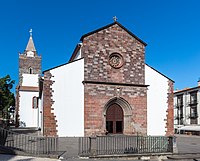| Cathedral of Our Lady of the Assumption | |
|---|---|
 Facade of the Cathedral Facade of the Cathedral | |
 | |
| 32°38′54″N 16°54′30″W / 32.648333°N 16.908333°W / 32.648333; -16.908333 | |
| Location | Madeira, Funchal |
| Country | Portugal |
| Denomination | Roman Catholic |
| Website | https://www.catedraldofunchal.com/ |
| History | |
| Dedicated | 1514 |
| Consecrated | 1517 |
| Architecture | |
| Completed | 1514 |
| Administration | |
| Province | Patriarchate of Lisbon |
| Archdiocese | Patriarchate of Lisbon |
| Diocese | Diocese of Funchal |
| Clergy | |
| Archbishop | Dom Manuel Clemente |
| Bishop(s) | D. Nuno Brás da Silva Martins |
| Deacon(s) | Vítor dos Reis Franco Gomes |
The Cathedral of Our Lady of the Assumption (Portuguese: Sé Catedral de Nossa Senhora da Assunção) in Sé, Funchal, Madeira, Portugal, is the cathedral of the Roman Catholic Diocese of Funchal, which encompasses all of the Autonomous Region of Madeira. The late fifteenth-century cathedral is one of the few structures that survives virtually intact since the early period of colonization of Madeira. The patron of the cathedral is Our Lady of the Assumption (Portuguese: Nossa Senhora da Assunção).
Design and artwork
The cathedral is designed in a Gothic style and has three naves. The building was constructed using thousands of blocks of volcanic rocks carried from the cliffs at Cabo Girão, namely trachybasalt, trachyandesite, trachyte, tephrite and ashes, lapilli and breccia tuff. The facades are predominantly plastered and painted white, with stonework corners.
The roof of the cathedral features a Mudéjar-inspired design and is of cedar wood. The wooden choir stalls depict prophets, saints and apostles in 16th-century garb. In the decorative details of the seats and armrests, aspects of Madeira's life can also be seen, such as cherubs carrying a bunch of bananas or a wineskin.
The cathedral contains a silver processional cross donated by King Manuel I of Portugal, considered one of the masterpieces of Manueline liturgical silverwork.
As Pope John Paul II visited Madeira in 1991, a statue of Pope was built to remember the event. It is located outside the cathedral, which was moved to its current position after formerly being installed in the urban area of Funchal adjacent to the waterfront.
History
During the 1490s, Manuel I sent architect Pêro Anes or Gil Enes to work on the design of the Cathedral of Funchal. The cathedral was structurally complete in 1514. Prior to completion, however, by 1508, when Funchal was elevated to the status of a city, the cathedral was already being used for the celebration of Mass. The spire of the bell tower and a few additional details were finalized in 1517-1518.
Coat of Arms
References
- Diocese do Funchal (official site in Portuguese). Archived 2011-10-02 at the Wayback Machine
- Diocese do Funchal (official site in Portuguese). Archived 2011-10-02 at the Wayback Machine
- "En visite à Lisbonne et à Fatima Jean-Paul II célèbre le passé missionnaire du Portugal". Le Monde.fr (in French). 1991-05-12. Retrieved 2020-11-27.
- Since to this diocese were submitted all new lands discovered by Portuguese in America, it became, for some years, the biggest Catholic diocese in the world. Diocese do Funchal (official site in Portuguese). Archived 2011-10-02 at the Wayback Machine
External links
- (in Portuguese) Diocese of Funchal - Information about the Cathedral
- Cathedral of Our Lady of the Assumption - gcatholic
- Diocese do Funchal - Catholic Encyclopedia
| Cathedrals in Portugal | ||
|---|---|---|
| Ecclesiastical province of Braga |  | |
| Ecclesiastical province of Évora | ||
| Ecclesiastical province of Lisbon | ||
| Metropolitan cathedral Patriarchal cathedral Co-cathedral No longer used as cathedral | ||
- Buildings and structures in Funchal
- Churches in Madeira
- Gothic architecture in Portugal
- Mudéjar architecture in Portugal
- Roman Catholic churches completed in 1514
- Roman Catholic cathedrals in Portugal
- Tourist attractions in Funchal
- 1514 establishments in Portugal
- 16th-century Roman Catholic church buildings in Africa
- 16th-century Roman Catholic church buildings in Portugal
